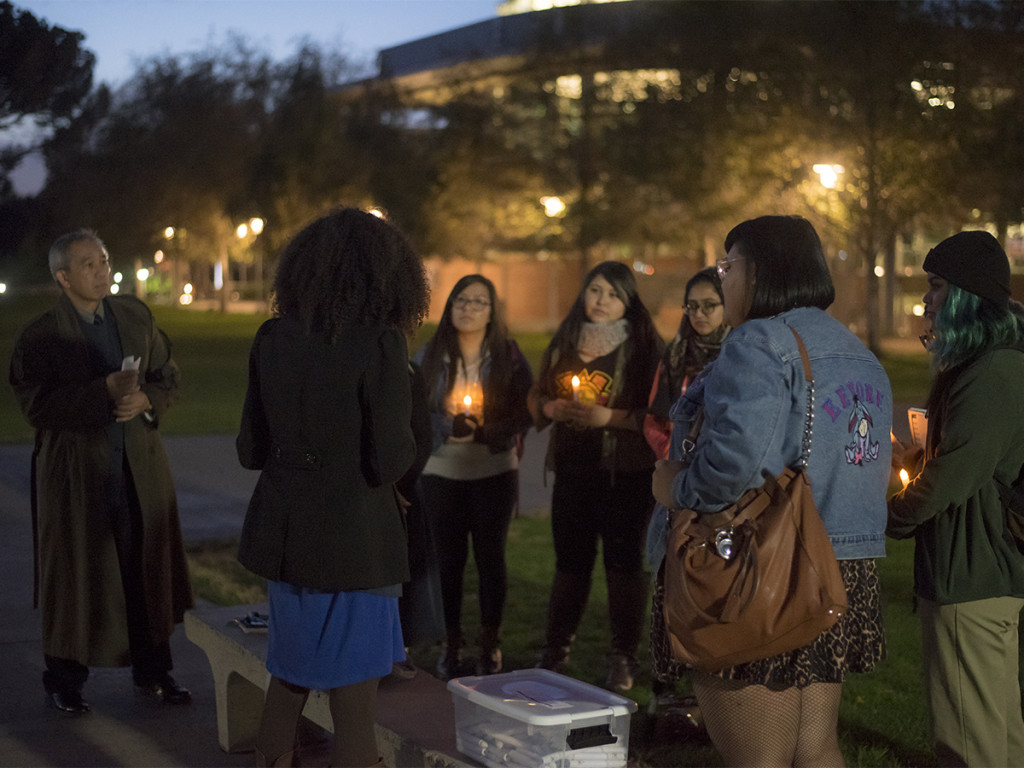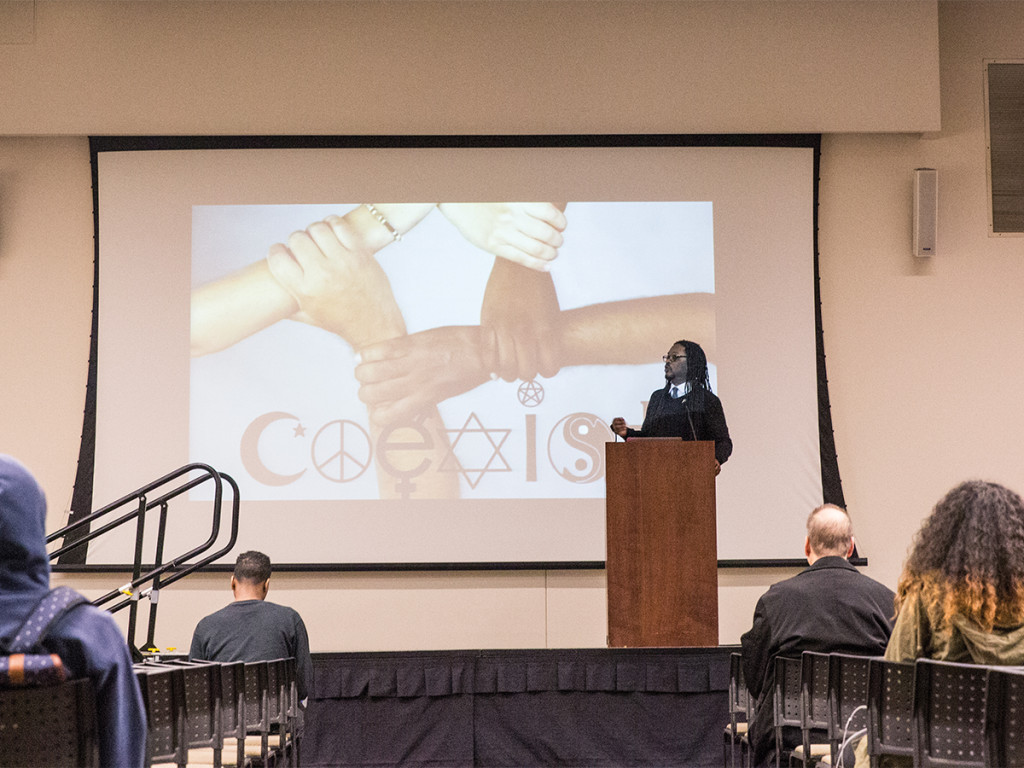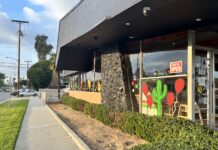To honor Martin Luther King Jr., the impactful civil rights activist who is credited for leading a nonviolent approach to gaining rights in the 1960s, African Student Programs (ASP), amongst many other on-campus organizations, organized a three-part celebration on Wednesday, Jan. 11. The day was originally planned to start with a noon event at the Bell Tower (which was unfortunately cancelled due to poor weather conditions) but initiated with a unifying candlelight vigil and concluded with a seminar hosted by Lawrence Ross, an American author and lecturer who wrote “The Divine Nine: The History of African American Fraternities and Sororities,” both of which left students with a loving and audacious image of the individual Dr. King truly was.
“We must accept finite disappointment but never lose infinite hope.” -MLK J.r.
(Quote of the Week: Submitted by Martha Delgado)
Candlelight Vigil

By: Martha Delgado, CW
ASP couldn’t have honored the late Dr. King on a better day, for although the federal holiday lands on Monday, Jan. 16, ASP happened to celebrate their 45th anniversary on Wednesday, Jan. 11.
“The purpose of the vigil is to remember someone who lost their life due to a tragedy and honor their memories,” explained Rhiannon Little-Surowsky, the student affairs officer for ASP. “We reflect internally and have an opportunity for the participants to share any memories or anything they want to share about the person that we are honoring.”
Once the sun set, the Bell Tower area was lit by candles held by attendants as they formed a small circle. Participants were encouraged to share out loud what Martin Luther King Jr. meant to them or how they used his teachings.
Kat Zoque, a fourth-year ethnic studies and gender and sexuality major was the first to share their experience with King’s work. “I remember actually studying Dr. King and his speeches in my ethnic studies class and thinking that he has a lot more depth to him than history makes him out to be. As a brown person always standing in solidarity with the black community, there is so much anti-blackness. It’s so hard to see, but I can’t even imagine how hard it is to experience it,” Zoque articulated.
Joana Reyes, a fourth-year sociology major was the second to express the importance of King in her upbringing. Reyes knew her family was different from the American families found in the elementary school social studies and history books and recognized King as a significant historical figure whose appearance evoked for her a sense of familiarity. “As a child, it’s symbolic to know that a person of color is in the history book and is highlighted as someone who we should look up to,” Reyes expressed.
Emilio J. Virata Jr., the assistant dean of students in Division of Student Affairs, was the final speaker of the night. “Sometimes we put barriers in place when they don’t need to be there. How I think Dr. King’s work influenced me was that he looked not only at a civil rights movement for the African-American community — he looked for justice across the world,” said Virata. “The lessons that I think Dr. King’s work carried for me are all about how we really need to think about how we are connected to one another versus how we are separated from one another.”
I remember actually studying Dr. King and his speeches in my ethnic studies class and thinking that he has a lot more depth to him than history makes him out to be.
As the most diverse UC statistically, UCR’s vigil was a chance for students of various demographics and ethnic backgrounds to share the significance of King’s work on both their own personal lives and development as well as the lives of their community members.
“Most people think it’s just a day they get off, but it is a day to honor his legacy. He was a champion for not just black people but for all people,” said Little-Surowsky. King’s work was a positive influence for many and offers inspiration for the plethora of students concerned about the country’s upcoming four years. Thus, even though the 2016 presidential election felt to many people like a step backwards from progress, the vigil served to remind the UCR community to remain united through future adversity.
Lawrence Ross explains importance of MLK legacy

By: Edward Dave, CW
The commemoration continued later that night with a lecture from Ross in HUB 302 intended to highlight the exemplary life that King lived as well as analyze the myths and truths of his wide array of actions.
Little-Surowsky, the main coordinator of the event, began by reading aloud a passage from one of King’s acclaimed sermons, “The Drum Major Instinct.” The speech was a reflection of King’s wishes for individuals to pilot their life to carve their own destiny.
“He wasn’t just about black rights — he was an advocate for all rights, which is what UCR stands for,” Little-Surowsky proclaimed as she concluded her opening monologue on King.
Afterward, Little-Surowsky introduced the second segment of the event, which featured a host of UCR students who performed respective pieces that related to King. First up was second-year Ph.D student in critical dance studies, Cuauhtemoc Peranda. Peranda performed a stirring dance routine to music by Diamanda Galas, an American avant-garde soprano and pianist who often incorporates discussions of injustice and condemnation in her work. The performance featured a flurry of expressive poses that ranged from extremely peaceful to assertive to symbolize the act of tenacity from a cultural perspective.
The performance was an ode to the oppression and hardships marginalized groups experience and the constant incessant need to break out from a state of being stagnant. Galas’ “This Is the Law of the Plague” emanated loudly behind him as he matched the song’s intensity with a corresponding gesture.
Next, Josh Thunder Little, a fourth-year double major in history and Native American studies, took center stage and recited a powerful quote from King’s 1963 book, “Why We Can’t Wait.” It was a quote that was centered around the inhumane treatment that Native Americans, and other indigenous cultures face while living in America. Little went on to explain why the quote resonates with him.
“It’s important for people to understand the struggles of what people of color go through. Upholding the ideas of MLK is very important to ensuring we attain peace and equality in this nation,” Little announced.
Little’s speech was met with praise, and the crowd jolted with applause because of his eloquent ability to break down his personal connection to King’s ideology. Alexander Wilson Jr., vice chancellor of student affairs intern, exchanged places with Little following the speech and stood proudly in front of everyone to read his own spoken word poem. “American Progress” was an extremely poignant poem that tackled the unfair treatment minorities undergo while working excessively in a country that doesn’t want to fully embrace them.
“We need to acknowledge that people are coming from different cultural and educational understandings,” Wilson resonated.
Aiming to extend the message to other student demographics, Joe Virata, assistant dean of students, took charge of the event. He thanked everyone for attending and seized his five minutes of splendor to talk about the diversity of UCR. Going in depth, Virata referenced the LGBTQ and Undocumented Student Programs on campus as vital parts of our school because they represent a key minority to our overall melting pot of undergrads. He cautioned everyone to look out for others who may be going through similar alienation.
“We feel like we’re suffering in solitude, when in reality, thousands of others are also suffering.”
Virata reverted attention to Little-Surowsky again and she introduced the keynote speaker of the evening: Lawrence Ross, a prominent author and advocate for racial equality. Ross started by presenting his new book titled, “Blackballed: The Black and White Politics of Race on America’s Campuses,” then dove into his lecture by first enlightening the audience on numerous cases where racism was rampant on college campuses.
One such example he divulged into was the 2015 incident on the University of Missouri campus that saw African-American students deal with an administrative system that took a passive stance on quelling racial inequity. Ross also examined the 2015 incident in which members of the Sigma Alpha Epsilon fraternity on the University of Oklahoma campus were discovered chanting racial slurs. After seeing these events play out, Ross began to develop a tangible map that plotted out these occurrences in a way that framed their connection to each other. “History doesn’t so much repeat as it rewinds,” Ross explained. It became priority for Ross to deconstruct these isolated cases in a way that would be digestible for the world to receive.
In an effort to talk about racial inequity, Ross broke down King’s plight as an advocate of love. According to him, King was someone that wasn’t a colorblind man like so many people like to frame him. King was someone that was cognizant of color, but he wanted to exploit the differences of groups of people in an attempt to bridge communities together. Ross stated that when people bring up King, they often use a form of erasure as they marginalize his approach to equality. According to Ross, King was someone who utilized his platform to insert love in a society that was being dictated by fear and that by keeping his ideology in mind, people can forge their own paths to racial equality.
“MLK is much more than a signal. He is a call to action,” Ross exerted.
Using examples of student protests at Berkeley and UCLA, Ross drove home his point about how King’s methodology is still rippling in effect to this day. King laid a foundation that can easily be picked up by any individual willing to stand up to unjust systems.
Before the event came to an end, Ross answered a few questions from the audience. One in particular raised the question about what types of steps individuals should take to call out oppression.
“First you need to call it out, break it down, then proceed to dismantle it using whatever means available,” Ross vocalized.
The event came to a close with a resounding applause for Ross. Everyone in the building left with a much better understanding of King not only as an idol but as a human being with a transcendent dream.







